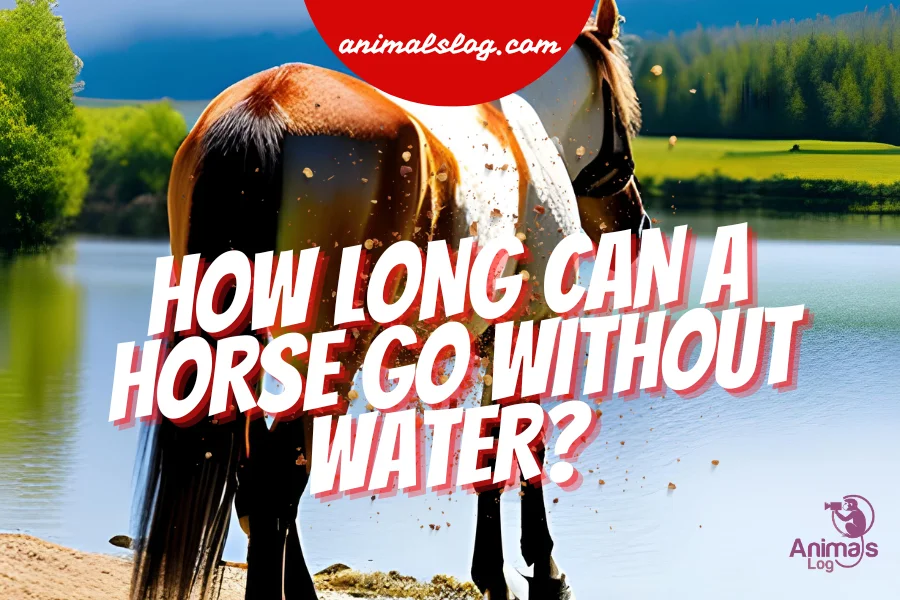Water is one of the most essential elements of the salubriousness in horses. Managing water availability for horses during travel is of utmost importance. In today’s post, we will discuss topics like: how long can a horse go without water? How can dehydration affect a horse? How much water do horses drink?
Importance Of Hydration In Horses

A horse’s routine needs include water, which is both a fundamental and essential element. It is crucial for owners and individuals to comprehend and value the significance of giving horses access to a sufficient amount of clean, fresh water.
- Thermal Regulation – Due to their size and low surface-to-body mass ratio, horses are more prone to overheating than other big animals. Horses naturally cool themselves by sweating and evaporating water, which aids in controlling their body temperature.
- Aid to Digestion – Water aids in horses’ digestion, waste removal, and oxidizing food. It helps in the shift of essential nutrients and oxygen to the internal organs and the elimination of metabolic waste from the body.
- Joint Problems – Water facilitates smooth and easy movement by lubricating the joints, decreasing friction, and providing cushioning. Consuming enough water reduces the risk of joint-related problems and stiffness and helps to maintain the wellness of the joints.
- Easy Swallowing – Water is essential for the decomposition and absorption of feed ingredients such as hay, grass, and concentrates. The meal becomes softer and more moistened, which makes it relatively easier to swallow.
- Elimination of Waste – For a horse’s body to effectively eliminate waste products, proper hydration is essential. Water makes it easier for urine to move through the body, which helps to flush out waste and preserve the urinary system’s health.
- Prevents Dehydration – The entire health and well-being of a horse depend on maintaining proper water intake. Electrolyte imbalances, decreased appetite, weight loss, low energy, and a weakened immune system are just a few of the health issues that can arise from dehydration.
Water Requirements Of Horses
In order to properly care for horses and ensure their general health and well-being, it is essential to understand their water needs. For maximum performance and vitality, horses must be properly hydrated since they depend on water for many physiological functions.
- Horses typically require a certain amount of water in relation to their body weight. In comparison to smaller horses, larger horses need more water. Horses normally require between 0.5 and 1 gallon of water per 100 pounds of body mass.
- In order to make up for greater perspiration and a greater amount of fluid loss via evaporation, horses living in hot, humid climates or throughout the summer need to drink more water.
- To avoid dehydration and replace fluids lost via perspiration, horses engaged in an intensive activity like racing or endurance riding may need supplemental water before, during, and after exercise.
- Horses who eat mostly dry fodder, such as hay or straw, require extra water to help with digestion. Because the feed already includes moisture, horses that are fed moistened or soaked feeds typically require less water.
- It is crucial to always have clean, fresh water available for horses. Horses naturally have a need for water, and they control how much they consume based on their physiological requirements.
- If the water tastes bad, has a bad smell, or has a lot of contaminants in it, horses may not drink it. Additionally, high water temperatures, either too hot or too cold, can deter horses from consuming enough water.
- Each horse is different, and those differences may have an effect on the water requirements. It is critical to keep an eye on each horse’s water consumption patterns, monitoring water intake for optimal equine health and making adjustments as necessary to satisfy their individual demands.
Managing Water Availability For Horses During Travel

- Before starting a journey, make sure your horse has enough water. In the days before the trip, make sure they have access to fresh water.
- When transporting water, use clean, durable containers. To avoid spills and contamination, it is preferable to use portable water tanks or jugs with tight-fitting lids.
- Plan numerous water stops for your horse—ideally every three to four hours. This enables them to hydrate, move their legs, and urinate.
- Maintain a regular schedule for water breaks. Offering water at regular times might encourage horses to drink since they can get used to routines.
- Offer water from your horse’s natural source whenever feasible. This can lower the possibility of rejection brought on by strange flavors or odors.
- Depending on the weather, alter the frequency of water breaks. In warmer weather, horses tend to drink more, so be ready to provide water more regularly.
- Make use of a bucket or trough that is comparable to the one your horse is used to at home. Bringing their regular water container might assist some horses who might be hesitant to drink from strange ones.
- Consider providing electrolytes in the water if the trip is exceptionally long or is taking place in hot weather. For advice on dose and timing, talk to your veterinarian.
Effects Of Dehydration On Horses
Dehydration is an acute condition that can harm a horse’s well-being and overall health.
- The capacity of a horse to perform and endure exercise is directly impacted by dehydration. Horses that are dehydrated could find it difficult to maintain their typical level of athletic activity, which might reduce their work capacity and increase the risk of injury.
- Dehydrated horses may experience electrolyte imbalances due to fluid loss via perspiration, especially during physical activity or in warm temperatures. Electrolyte loss through perspiration in horses without enough replacement might interfere with normal physiological functions.
- Consuming insufficient water might cause dry, compacted feces, which raises the danger of impaction colic. Horses that are dehydrated may consume less feed, digest more slowly, and absorb nutrients less effectively.
- For horses to maintain healthy kidney function and urine output, water is crucial. Dehydration can lead to urine becoming more dense, increasing the likelihood of developing urinary crystals or stones.
- Horses that are dehydrated are more vulnerable to heat stress because they lack the fluids needed for effective thermoregulation. Heat exhaustion or heat stroke may result in extreme cases of this, along with overheating, accelerated breathing, and pulse rates.
- Horses that are dehydrated may decrease their appetite and consume less feed. Lack of water can make feed unpleasant to eat and challenging to swallow, which reduces nutritional absorption.
- An immune system that works effectively depends on enough water. Horses who are dehydrated may have reduced immune systems, making them more prone to diseases, infections and slower wound healing.
How Long Can A Horse Go Without Water?
Horses are extraordinarily strong creatures, but they can only tolerate so much dehydration. The precise length of time a horse may go without water depends on various variables, including the environment and the horse’s health. There may be emergency situations that lead to horse water deprivation. In such cases, horses can often last three to six days without having access to water. It is crucial to remember, though, that serious health issues can develop far sooner. For that reason, rehydrating a horse after water scarcity is of utmost importance.
FAQs on How Long Can a Horse Go Without Water
How much water does a horse require?
A horse drinks, on average, 5 to 10 gallons of water every day.
How can you tell your horse is thirsty?
Dry mouth, loss of appetite, sunken eyes, decreased urination, and elastic skin are some signs that may point toward a thirsty horse.
Final Thoughts
Water is a crucial part of a horse’s daily needs, and its lack can have serious health effects. Now, you may wonder how long a horse can go without water. Although horses can do without water for a short while, it is still important to give attention to their hydration requirements.







